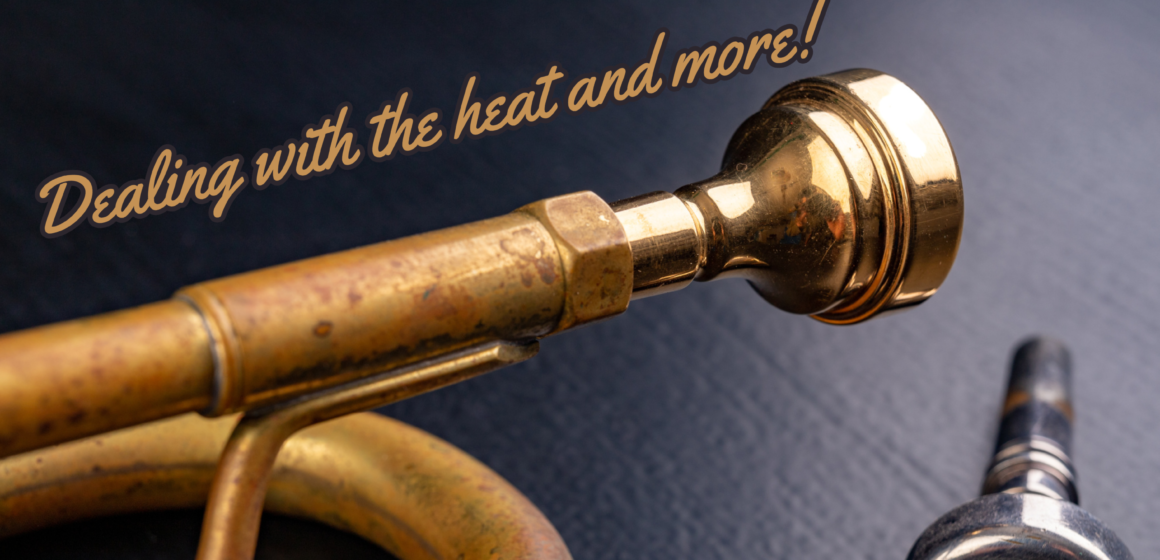Instrument Care Tips
As with most things like appliances, houses, cars, and even weight (looking at you, carbs…), it’s far easier to prevent problems before they start than to fix a developed issue. Instrument care is no different, and there’s a lot that you can do to keep your beloved musical friend in good condition! This is particularly crucial during summer months in Florida – yikes to all that humidity!
First Things First – Heat and Humidity:
There’s no way around it: this state is brutally hot. It’s best to treat your instrument just like a person or a pet. If you would be overheated in a certain situation, your instrument would be as well. Never leave your instrument in a car or outside for extended periods (this includes overnight!). If you’re enjoying marching band camp or must be outside, try to keep your instrument in the shade or out of direct sunlight.
UV damage from the sun is a real issue. We don’t have sunscreen for instruments, but it’s a good idea to move your indoor musical friends away from windows with direct sunlight. This not only prevents discoloring, but it reduces tuning issues and prolongs overall instrument life!
Humidity is the real enemy of all acoustic instruments, and left unchecked, it can ruin your instrument and leave it requiring major repairs. Your instruments should always spend the majority of their time indoors in a climate-controlled environment. If your house is particularly humid, a small dehumidifier for the room may be a good idea. You can also experiment with desiccant packs in the instrument case (beware, they do wear out eventually). Acoustic pianos may require dehumidifier bars that can be easily installed in the shell. If you have a particularly valuable instrument that lives in a case, special humidity-controlled cases are available for a pretty penny.
Wood Instrument Care:
Even many years after its creation, wood forever remains an organic substance that is impacted by humidity and external conditions. Check with your Songbirds instrument technician about what treatment your instrument wood needs to stay healthy. For example, most woods need to be occasionally oiled to prevent a complete dry-out which leads to cracks and damage. Lemon oil is available, but you can also use mineral oil as it is the same thing without the added fragrance – plus it’s not as expensive!
A gentle abrasive like 0000-grade steel wool or a fine Scotch-Brite pad may be useful for removing built-up dirt and grime on the surface of the wood. I always recommend lubricating abrasives with a bit of mineral oil and rubbing with the grain of the wood to prevent scratches.
The Secret Weapon:
Microfiber cloths! These handy rags do a ton of heavy lifting with instrument care. Use them to wipe down your instrument after use and remove fingerprints and oils. You can also use them to apply oil or cleaning products, plus they do a fantastic job with buffing and polishing. Just be careful to keep them clean – if something sharp or gritty gets stuck in a microfiber cloth, your instrument may get scratched!
Buffing and Polishing:
No matter what you play, your instrument probably has some metal pieces. Any good automotive polish works wonders in brightening your metal hardware and removing light scratches. I prefer McGuiars – look for one that has a high or very fine finish!
Extra Tips:
Wipe down your instrument after each practice session, especially if you are prone to sweaty hands like me! The natural oils from our body don’t play well with instruments, and a gentle wipe goes a long way in preventing damage. It’s like brushing your teeth!
If you play a stringed instrument, you’ll likely notice the need for more frequent string changes in the summer months. This is normal, don’t worry. Some string cleaning products may be helpful in prolonging corrosion, but I find it best to spend a few extra bucks and purchase coated strings that are resistant to sweat and oil.
For brass instruments, try to buff out scratches and scuffs soon after they happen so that they don’t build up and get worse. If a scratch exposes bare metal, check with your technician on how to prevent rust and corrosion.
Keep a tuner handy – your instrument will go out of tune frequently in the summer!
Conclusion:
I hope that these tips help you keep your instruments in their best shape and away from damage! Just remember that being proactive goes a long way and can help save you money on future repairs. Stay tuned for future installments of the Knowledge Blog, keep practicing, and stay cool out there! Don’t forget to hydrate, of course!

